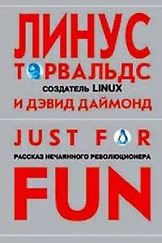"I wanted to start with a lawyer joke, but that was taken," he says, a reference to antitrust-suit-plagued Bill Gates's well-received opening the previous night: "Anybody heard any good lawyer jokes?"
He proceeds to give a one-sentence hint at Transmeta's secretive operation. Then the rest of his speech consists of rattling off the sentences that are flashed on slides high above his head, statements about the growing importance of open source. Nothing surprising. Nothing new.
It is delivered in a tired-but-cheerful monotone. At one point, one of his daughters cries.
In mid-sentence he says, "That's my kid." You could look up at the monitor and see the stage lighting reflecting off the beads of sweat on his forehead.
Afterward, audience members line up for questions. He quickly declines to say which of the Linux word processing software he prefers. When someone asks him how many stuffed penguins he has at home, he answers: "Quite a few."An audience member asks how he likes living in California, to which he responds by rhapsodizing about the weather. "It's November and I'm still wearing shorts. In Helsinki I'd have lost my crown jewels by now." A fan walks up to the microphone for audience questions and announces, simply, "Linus, you're my hero. " To which Linus responds, as if he has heard the same statement a million times and answered it a million times: "Thanks."
After the questions are over, hundreds of people flood into the area below the podium, where Linus has now moved and is shaking as many hands as he possibly can.
IX.
Is the Linux Revolution Over?
By Scott Berinato, PC Week
"Thank you for calling. The Revolution is over. If you would like further information on Linux, please press one..."
It appears Linus Torvalds has a handler, which must mean this whole Linux thing is mainstream, so forget about the revolution and get back to work on your Windows desktops.
Once was a time when reporters could call the inventor of the Linux operating system at his office at cloak-and-dagger marketed Transmeta Corp., punch in his extension and receive a familiar declarative "Torvalds" from the man himself on the other end. He was patient and he answered your questions. He told you when he had no time. Sometimes he told you when you asked useless neophyte programmer questions. But he answered the phone.
Today, when you call Transmeta and punch in his extension, a pleasant female voice greets you. "Thank you for calling Linus Torvalds. This voice mail does not accept messages. To contact him, please send a fax to .. ."
What? And it starts to sink in: He's not getting back to you. He's had enough. He's a celebrity and getting a quick interview with him now will be like getting a quick interview with that other big computer industry celebrity. The woman rattles off a fax number and you're already thinking of hitting the old 0-# combo for a receptionist...
"Our receptionists do not take messages for him, nor do they keep his calender." D'oh. She's pleasant. The worst. "But they will gladly get your fax to him." Uh-huh. And Bill will gladly break up Microsoft to appease David Boies.
Okay, so the Linux revolution isn't over, but like any revolution, the rag-tag riffraff is being superseded by mainstream sympathizers. Suburban new wave supplanted urban punk rock. Wealthy landowners in the colonies rose up after the poor taxed man. (The wealthy landowners, by the way, later tried to foist on frontiersmen a whiskey tax not so different from the tea tax imposed on them a few years earlier.)
In fact, it's probably high time Linus stepped back. It was inevitable, really, given the number of press calls and the maddening range of topics he was fielding.
Take his press Q+A session at the Linux World Expo in San Jose earlier this month. Torvalds, who agreed to the session because he simply didn't have time to field the innumerable individual requests, first had to rattle off what were becoming familiar answers to familiar questions. Can open source work in the business world? Are you trying to rule software the way Bill Gates rules software? What do you think of Microsoft? What is open source? What is Linux? Why a penguin?
Torvalds, by this point, was clearly entering the canned realm of sports figures with his answers. Think Tim Robbins in Bull Durham: "I just need to go out there and give 110 percent to try and help the team..."
And beyond the redundant, the questions from journalists outside the tech world veered wildly. At one point during his press conference, the Finnish phenom was asked how he was going to capture the small and medium business market. (Typically Torlvaldian retort: "I personally haven't tried to capture anyone. ") Two questions later, an eager, I've-got-a-unique-angle-to-this-open-source-mess reporter asked Torvalds what he thought of corporations patenting agricultural genomes. (Typically quotable Torvaldian response: "I'm of two minds when it comes to patents. There are good, {3} 3 Printed book says "There are good bad ones and really bad ones.", added comma in the listing.
bad ones and really bad ones.")
Programmers, heed this: If someone starts asking you about agricultural genomes, it's likely time to get a handler.
So maybe it's a good thing that Linus doesn't answer his phone anymore. Still, we'll miss the candor and self-deprecation of Torvalds, which came across so genuinely to reporters used to burning their throats on the dry, pressurized-airplane-air marketing being blown by most companies. And we hope, if faxes do in fact reach his desk, and he does in fact respond to questions, he will keep the Torvaldian tone.
Because if the faux-pleasant PR voices take over, this Linux thing won't be nearly so much fun.
Okay, I guess l owe Mr. Berinato an explanation, but not an apology.
Anyone reading this column would assume the mounting pressures of my role as chief nerd had turned me into an asshole. But that's wrong. I always was an asshole.
I'll start at the beginning. I think voice mail is evil. It is the perfect example of a bad technology. In fact it is the worst technology that exists, and I hate it with a passion. So at Transmeta we started out with a per-user voice mail system that allowed each employee to store twenty minutes worth of messages. After that, callers got the message saying the mailbox was full, please contact the receptionist. Mine was always full.
I think it was the journalists who caused the backlash. They would badger the Transmeta receptionists because my voice mailbox was full. After the first hundred times, the receptionists started getting irritated. They knew I wasn't interested and they didn't want to be the ones telling people to fuck off.
So I started deleting messages without listening to them, just so the front desk people wouldn't get annoyed. Most of the time I would never listen to my messages, anyway. For one thing, people usually mumble their phone numbers into the recording, and I would have to listen fifteen times just to figure out what they've said. Also, I refuse to call people back if I have no reason to call them back. People would get a warm and fuzzy feeling that they had left a message. Until they realized I wouldn't return their call.
That's when they would call the receptionist. The receptionist wouldn't know what to say, so I would tell him or her to tell the caller to fax me. Faxes are as easy to ignore as voice mail, although at least with a fax you could make out the number, should you want to. I never wanted to.
At first, the receptionist politely told callers to please send me a fax. Eventually, people caught on to the fact that I didn't read the fax, and they would call back a week later and complain that they had already faxed me. So the receptionist again got caught in the middle. It wasn't her job to handle my calls.
Читать дальше












